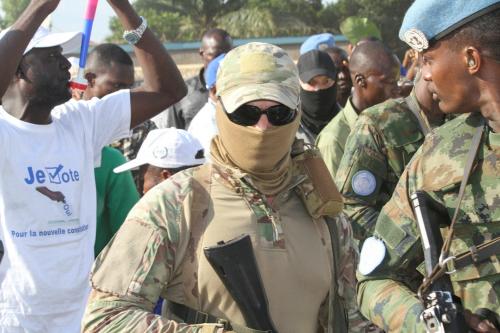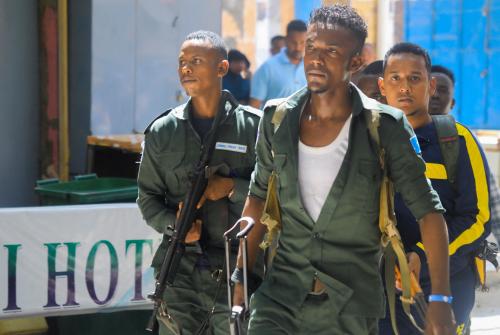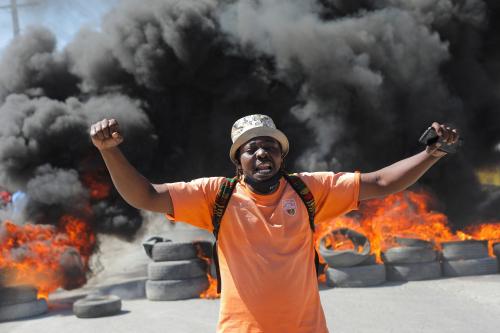This commentary is the second in a two-part series. In the first commentary, Vanda Felbab-Brown lays out how the coup in Niger has unfolded and, in response to Western and regional reactions, veered toward an anti-Western posture. In the second, she describes U.S. interests in Niger, and the range of scenarios ahead.
An ultimatum from the Economic Community of West African States (ECOWAS) to Niger’s junta to hand power back to the elected Nigerien President Mohamed Bazoum expired on August 6. The junta has not backed down. With much bluster, the new Nigerian President Bola Tinubu heading ECOWAS committed the regional organization to using military force to throw the junta out, but the Nigerian Senate has so far rejected deploying the Nigerian military.
The hard choices are punted down
Pushing tough decisions down the road remains an option. By extending the negotiations deadline, ECOWAS could choose to delay using military force, while maintaining its tough economic sanctions and trade blockade on Niger.
Despite dire humanitarian and economic consequences, the junta is unlikely to budge under the sanctions for a considerable time, especially if China, Russia, Turkey, and French uranium mining companies continue to do business.
But a negotiating process and deal could take various forms:
- The Nigerien junta could start complicated internal negotiations with various civilian politicians, such as the former Nigerien President Mahamadou Issoufou or Bazoum’s rivals, with or without Bazoum. Such negotiations could easily get bogged down, with the junta purposefully playing the Nigerien civilians against one another to avoid handing over power. Fraught processes among Sudanese civilian politicians and interest groups come to mind.
- The junta could form a joint transition government with a civilian politician other than Bazoum, such as Issoufou. This government could then promise to hold elections in a year or two. Yet when the timeline approached, the government would extend the process, repeatedly extending its rule. Mali, Chad, and Sudan are recent examples of this ploy.
- Simplest of all, the junta could simply issue the promise to hold elections in a year or so, without forming a joint civilian government in the interim.
Under which of these circumstances would ECOWAS pull back from an intervention?
Certainly, scenarios #1 and #2 complicate justifying the use of force by other African nations and maintaining ECOWAS’s military coalition. For Tinubu, this could be a face-saving maneuver.
Would the United States, France, and the European Union accept such a charade to maintain access to a crucial counterterrorism theater of operations and to keep Russia and the Wagner Group out of the West’s last Sahel bastion?
The first and second scenarios, let alone the third, would compromise commitments to democracy and perhaps prove unstable. But they would offer a diplomatic fig leaf.
The military intervention becomes a go
Military logic actually presses ECOWAS to go in quickly. A delay allows the Nigerien junta to strike a deal with the Wagner Group (or another Russian private security company, such as one linked to Russia’s Defense Minister Sergei Shoigu) to send in deployments, as the junta has requested. Wagner is stretched in Africa and would need some time to generate a substantial new force. But with Mali’s agreement, it could temporarily redeploy forces from there — if the Kremlin allowed it. After all, like Burkina Faso, Mali announced that an ECOWAS intervention would constitute a declaration of war on Mali itself. But for the Kremlin, the optics of Wagner fighting other African militaries, unlike jihadis, are bad — unless an early Wagner arrival in Niger helped deter the ECOWAS intervention.
A second reason for ECOWAS to go in quickly is because Western forces are still in Niger. Only France has offered — unspecified — support to the ECOWAS intervention. At minimum, the U.S., French, and EU forces in Niger could provide powerful intelligence. And ECOWAS could hope that if its military intervention came under intense fire and ended up stuck, the Western countries could not afford the souring of relations with Nigeria, Senegal, Côte d’Ivoire, and Benin, and would provide some weapons, planning, air power, or other assistance. If a military intervention is delayed until after the departure of Western forces, such support goes out the window, even should the West have the political will to assist.
A quick in-and-out toppling of the junta
In a rosy scenario, the intervention would go easily, like in Gambia. In 2017, Senegal deployed 7,000 troops there to compel Gambian President Yahya Jammeh to cede power to the election winner Adama Barrow. The weak Gambian military of also 7,000 men did not offer any resistance.
But the far bigger Niger has much heftier forces, trained by the West and with current combat experience. Despite hopes that, as happened during a failed 2021 coup attempt against Bazoum, the rest of Niger’s security forces would not join the presidential guard in the coup, the Nigerien military closed ranks around the putschists. Would it splinter or defect from the junta in the face of an ECOWAS intervention?
The ECOWAS intervention becomes a fight
In scenario two, ECOWAS would have to engage in tough urban fighting, at least in Niamey and potentially elsewhere.
Niger’s military stands at 25,000-33,000 men — some of whom perhaps are only soldiers on paper — but the total is 58,000 when combined with the national guard, police, and gendarmerie. Whether Mali and Burkina Faso back the Nigerien junta with their own forces remains to be seen, especially given the deteriorating security situation in Burkina Faso as well as Mali, despite, or rather because of, Wagner’s egregious and counterproductive counterterrorism tactics.
Nigeria’s military is the largest in West Africa, with an active force around 135,000 to 220,000.
But the Nigerian military will not be able to send in its entire force: Its men are deployed to quell serious internal security challenges in 32 out of 34 Nigerian states. It has struggled to successfully conclude any of these deployments, challenged by Islamist insurgents in the north, bandits and criminal groups there and in the Middle Belt, various ethnic insurrectionists, and criminal groups and cultists in the south.
Senegal, Côte d’Ivoire, and Benin promised to supplement the Nigerian forces. Among these, the Senegalese are the most powerful. But would a Niger intervention create blowback in Senegal, fracturing its armed forces or fanning anti-France sentiments? Heavily cracking down on political opposition and accusing it of sedition, the Senegalese government has claimed to avert several coup attempts this year.
Several recent ECOWAS interventions — Sierra Leone in 1998-2000, Guinea-Bissau in 1999, Mali in 2013 — did not produce glorious victories. The ECOWAS interventions ended up at best a holding force, or worse, stuck, eventually handing over to or being integrated into a broader U.N. force. But current geopolitical rivalries do not bode well for a broader U.N. force to parachute in.
Blowback at home
An ECOWAS intervention and any regional fighting will deplete the attention and capacities of all the involved militaries from fighting the lethal and potent ISIS- and al-Qaida-linked jihadis, secessionists, bandits, and criminal groups. The various nonstate armed actors will have an opportunity to ramp up attacks; the Tuareg in Niger and Mali can redouble secessionist efforts, as can various ethnic groups, such as the Igbo, in southern Nigeria. Jihadis would get far closer to the capitals of Mali and Burkina Faso.
Another ominous repercussion would be a further depletion of the Nigerian military. As it is, the Nigerian forces are overstretched and unable to deliver public safety, while Nigerian civilian institutions are failing to meet the needs and aspirations of Nigerians.
A weaker Nigeria would be far worse than a junta in Niger.
Looking for a new base and new ways to do counterterrorism
If Niger’s junta stays without an accepted fig leaf, and Western forces withdraw, where could they relocate their counterterrorism operations?
Chad is one option. Despite its authoritarianism, France has a base there already and the United States has extensive engagement with the potent Chadian military that shored up the struggling Nigerian military against Boko Haram several years ago.
Washington and Paris could also shop among West Africa’s coastal countries, something long talked about in Washington. Benin and Togo, both under intensified jihadi pressure, are two possibilities. In the Sahel, Mauritania might be explored: It too has a history of coups and a deeply checkered human rights record. But in 2019, it conducted elections and a peaceful transfer of power, and just recently, in May 2023, carried out parliamentary elections (with a landslide victory for the incumbent party).
But would the new hosts escape coups and would their relations with Washington be any more stable, especially if the United States did not separate itself from regionally-toxic France?
Alternatively or simultaneously, could the United States expand its counterterrorism repertoire by instigating in-fighting within and among pro-ISIS and pro-al-Qaida groups? Could it develop sufficiently robust intelligence and mount adroit-enough psychological operations to spark and control such infighting among the terrorists? And would such an approach discredit its global counterterrorism leadership, because local civilians would likely bear the brunt of the violence?
Or will the United States ramp up its problematic and mostly backfiring reliance on local militia proxies to fight the terrorists? The fleeting convergence of U.S. interests with the militias may be even weaker than with governments.
Whomever the United States lines up as a partner or proxy, the most important thing it can do is to develop the resolve to shape the partner to limit abuses and bad governance, not meekly subordinate these objectives to short-term battlefield imperatives.
The Brookings Institution is committed to quality, independence, and impact.
We are supported by a diverse array of funders. In line with our values and policies, each Brookings publication represents the sole views of its author(s).








Commentary
After the ECOWAS ultimatum, what’s next for Niger?
August 8, 2023